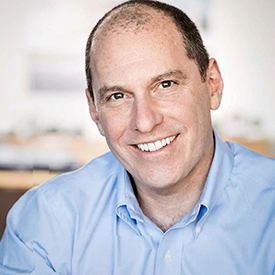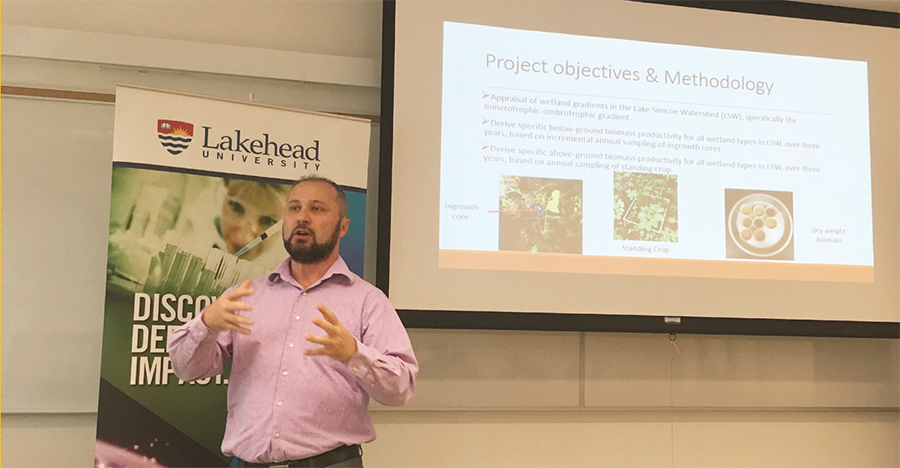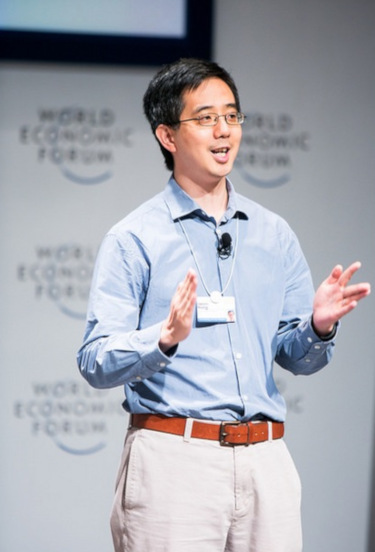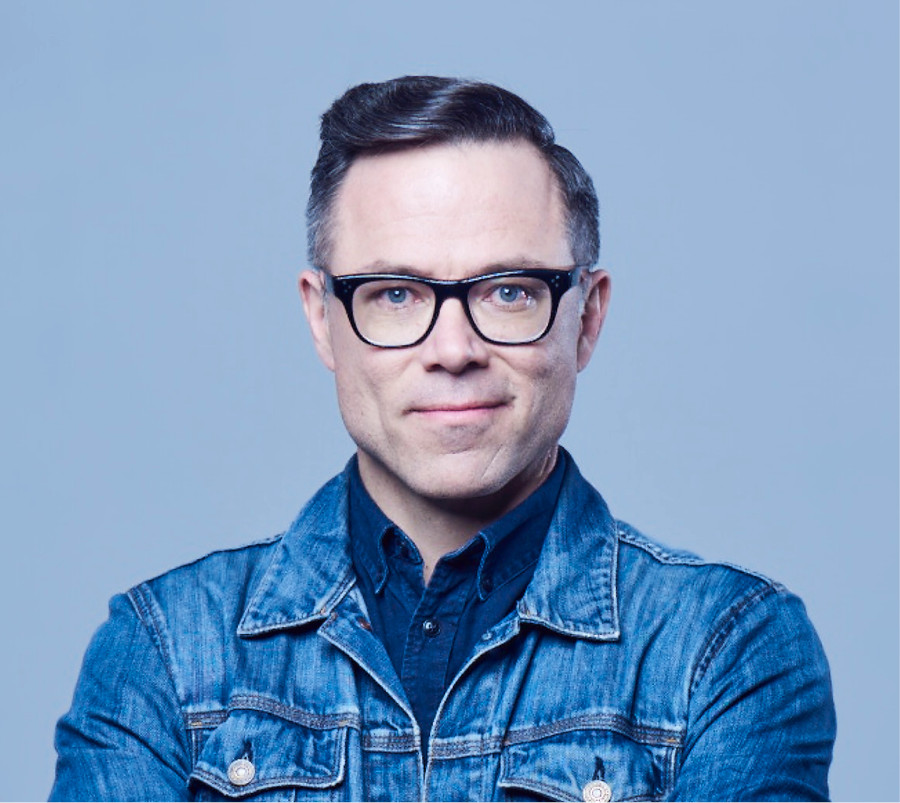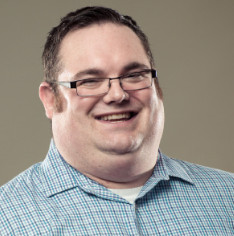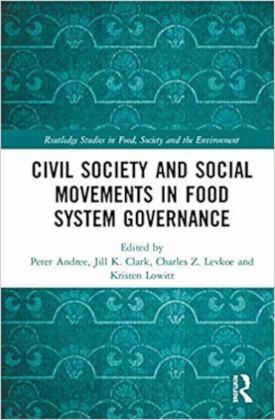
Lakehead's President and Vice-Chancellor, Dr. Moira McPherson, presented Dr. Michel Beaulieu with the Distinguished Researcher Award on Thursday, Feb. 28.
February 28, 2019 – Thunder Bay, Ont.
Lakehead University held its Research and Innovation Awards of Excellence reception on Thursday, Feb. 28 to celebrate the exceptional achievements of professors and students.
Dr. Michel Beaulieu was named the 2018 Distinguished Researcher for his work in History. His research is wide-ranging, generally focussing on the history of the political, economic, and social issues relating to northern and remote communities in Northern Ontario.
“I’ve found that good history is the sharing of those stories that are relevant to our times,” he said.
Growing up in southern Ontario, he worked in a museum, which helped spark his love of history and storytelling. Dr. Beaulieu is an award-winning author who has published more than a dozen books, dozens of articles and chapters, and has contributed to several film and new media projects.
He has also been the principle investigator or co-applicant on more than $3.5 million in research grants and has supervised more than 20 graduate students. Before working at Lakehead, he was a student there – Dr. Beaulieu completed his Honours Bachelor of Arts in English and History, a Bachelor of Education, and Master of Arts in History, all at Lakehead, before obtaining his PhD in History at Queen’s University.
“During my undergraduate degrees at Lakehead, I came to appreciate that the history of Ontario’s North has been little explored by historians,” he said.
“As I began my graduate education, it further increasingly became apparent that, even though some historians had written about aspects of the region’s past, few have recognized the history of Northern Ontario as a bona fide field, and even fewer still acknowledge its importance nationally and internationally.”
Dr. Beaulieu has held leadership roles with both Lakehead University and a number of regional, provincial, national, and international organizations.
He is currently a member of Lakehead University’s Board of Governors, Past-President of the Alumni Association of Lakehead University, President of The Champlain Society, Vice-President of the Ontario Historical Society, Vice-President of the Thunder Bay Historical Museum Society, member of the Board of Directors of the Multicultural History Society of Ontario, President of the Canadian International Council Thunder Bay Branch, and an Executive Member of the Northwestern Ontario Archivist's Association.
The Distinguished Researcher Award is the highest honour conferred by Lakehead for research and scholarly activity.
Dr. Andrew Dean, Lakehead’s Vice-President, Research and Innovation, said the University’s researchers make him proud.
“Congratulations to Dr. Beaulieu and to all Lakehead University researchers,” Dr. Dean said. “Whether they are students or professors, everyone in attendance should be proud of their work and this pride should fuel them to even greater accomplishments.”
Award Recipients
Three-Minute Thesis
- People’s Choice Award: Robert Sanderson, Master of Health Sciences (supervisor: Dr. Lindsay Galway)
- Second Place: Ayyappa Kumar Sista Kameshwar, PhD Biotechnology (supervisor: Dr. Wensheng Qin)
- First Place: Alexander Bilyk, PhD Forest Sciences (supervisor: Dr. Reino Pulkki)
Graduate Studies Research Excellence Awards
Natural Sciences and Engineering Category
- Mohamed Ahwiadi, PhD in Electrical and Computer Engineering (supervisor: Dr. Wilson Wang)
Social Sciences and Humanities Category
- Elizabeth Boileau, PhD in Educational Studies (supervisor: Dr. Constance Russel)
Health Sciences Category
- Carley Pope, PhD in Clinical Psychology (supervisor: Dr. Dwight Mazmanian)
Graduate Student Conference Poster Winners
- Winner Engineering Category: Ashkan Sahari Moghaddam, MSc Civil Engineering (supervisor: Dr. Ehsan Azar)
- Winner NSERC Category: Armin Eraghi Kazzaz, PhD Biotechnology, (supervisor: Dr. Pedram Fatehi)
- Winner SSHRC Category: Ema Cristina Ross Caicedo, PhD Forest Sciences, (supervisor: Dr. Brian McLaren)
- Winner CIHR Category: Jonathon Racine, MSc Kinesiology (supervisor: Dr. Erin Pearson)
Postdoctoral Fellows Poster Awards
- Health Category: Dr. Guillem Dayer, Department of Biology (supervisor: Dr. Ingeborg Zehbe)
- Tie: Natural Sciences and Engineering: Dr. Shazali Osman, Department of Mechanical Engineering (supervisor: Dr. Wilson Wang) and Dr. Samira Gharehkhani, Department of Chemical Engineering (supervisor: Dr. Pedram Fatehi)
- Social Sciences and Humanities Category: Dr. Rubén Mur, Faculty of Natural Resources Management (supervisor: Dr. Brian McLaren)
Indigenous Partnership Research Award
- Dr. Christopher Mushquash, Department of Psychology, Canada Research Chair, and Director of the Centre for Rural and Northern Health Research; and Tina Bobinski, Assistant Director of Mental Health and Addictions, Dilico Anishinabek Family Care. The award recognizes their numerous collaborative projects, which include key roles for Indigenous peoples, mutually beneficial outcomes for the researchers and Indigenous partners, contributing to the education of Indigenous students and unique dissemination of research results that take into account individual/community needs.
Innovation Awards
Student Innovation Award Winner
- Ayyappa Kumar Sista Kameshwar, PhD, Biotechnology
Faculty Innovation Award
- Dr. Sudip Rakshit, Department of Chemical Engineering, Canada Research Chair
Building Research Capacity Award
- Dr. Jinan Fiaidhi, Computer Science
- Dr. Sabah Mohammed, Computer Science
Community-Engaged Research Award
Title: “Shelter access for all women: Creating a harm reduction framework”
- Dr. Angela Hovey, School of Social Work
- Dr. Susan Scott, School of Social Work
- Dr. Lori Chambers, Department of Women’s Studies
- Liz Westcott, Executive Director, Green Haven Shelter for Women
- Silvia Samsa, Executive Director, Women's Habitat
- Marlene Ham, Executive Director, Ontario Association of Interval and Transition Houses
- As well as students Carly Roberts, Kaitlin Wilmshurst, Charlotte Scott, Shelby Thompson, and Sarah Tilley
Senate Research Committee Awards
Contribution to Research Award
- Dr. Lindsay Galway, Department of Health Sciences
- Dr. Claudio Pousa, Faculty of Business Administration
- Dr. Pauline Sameshima, Faculty of Education
Distinguished Researcher Award
- Dr. Michel Beaulieu, the Department of History
– 30 –
Media: For more information or interviews, please contact Brandon Walker, Communications and Marketing Associate, at (807) 343-8177 or mediarelations@lakeheadu.ca.
Lakehead University has approximately 9,700 full-time equivalent students and 2,000 faculty and staff in 10 faculties at two campuses in Orillia and Thunder Bay, Ontario. Lakehead is a fully comprehensive university: home to Ontario’s newest Faculty of Law in 44 years, the Northern Ontario School of Medicine, and faculties of Engineering, Business Administration, Health & Behavioural Sciences, Social Sciences & Humanities, Science & Environmental Studies, Natural Resources Management, Education, and Graduate Studies. Maclean’s 2019 University Rankings place Lakehead University among Canada's Top 10 primarily undergraduate universities and in 2018 Research Infosource named Lakehead Research University of the Year in its category for the fourth consecutive year. Visit www.lakeheadu.ca.


